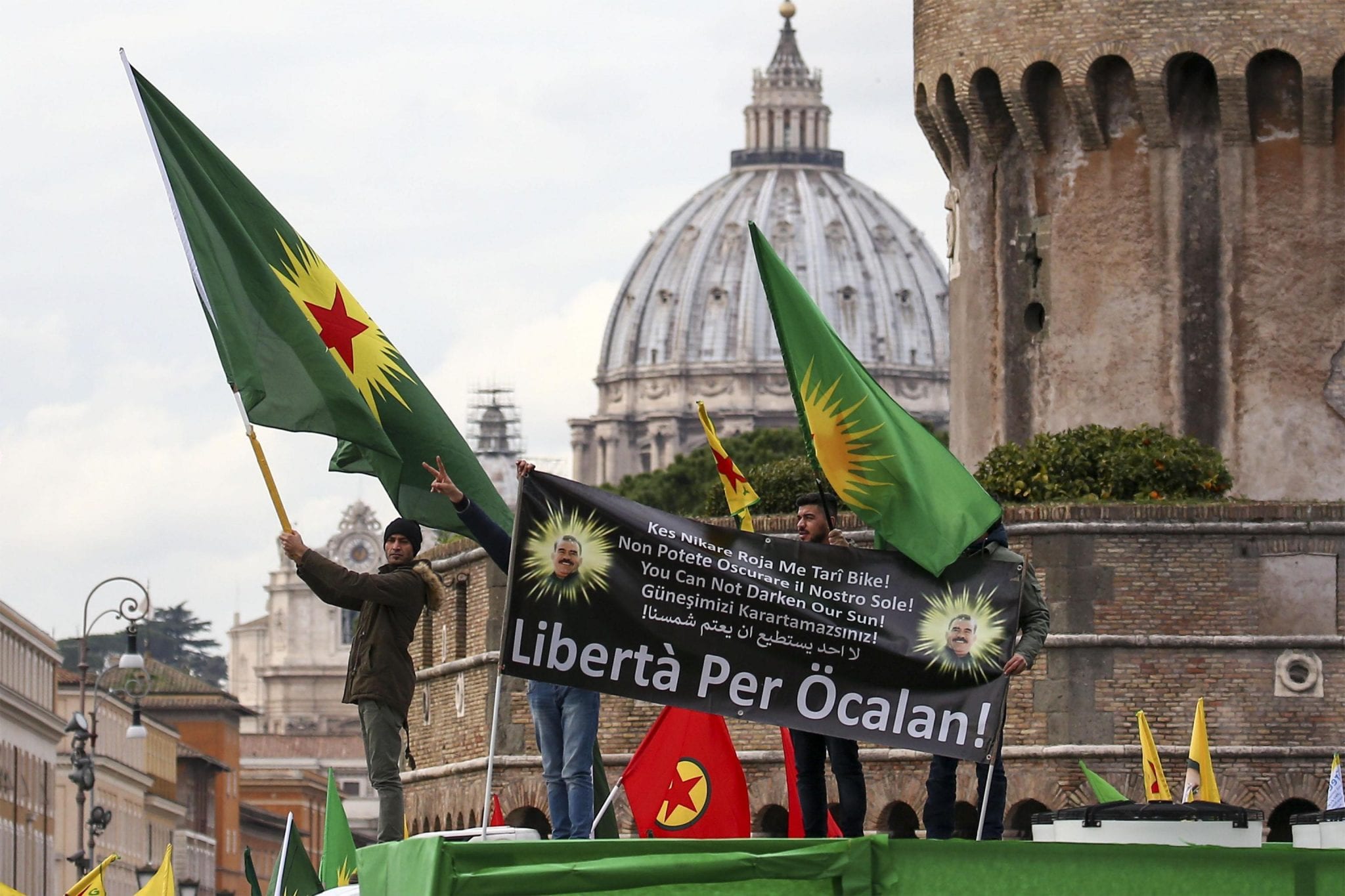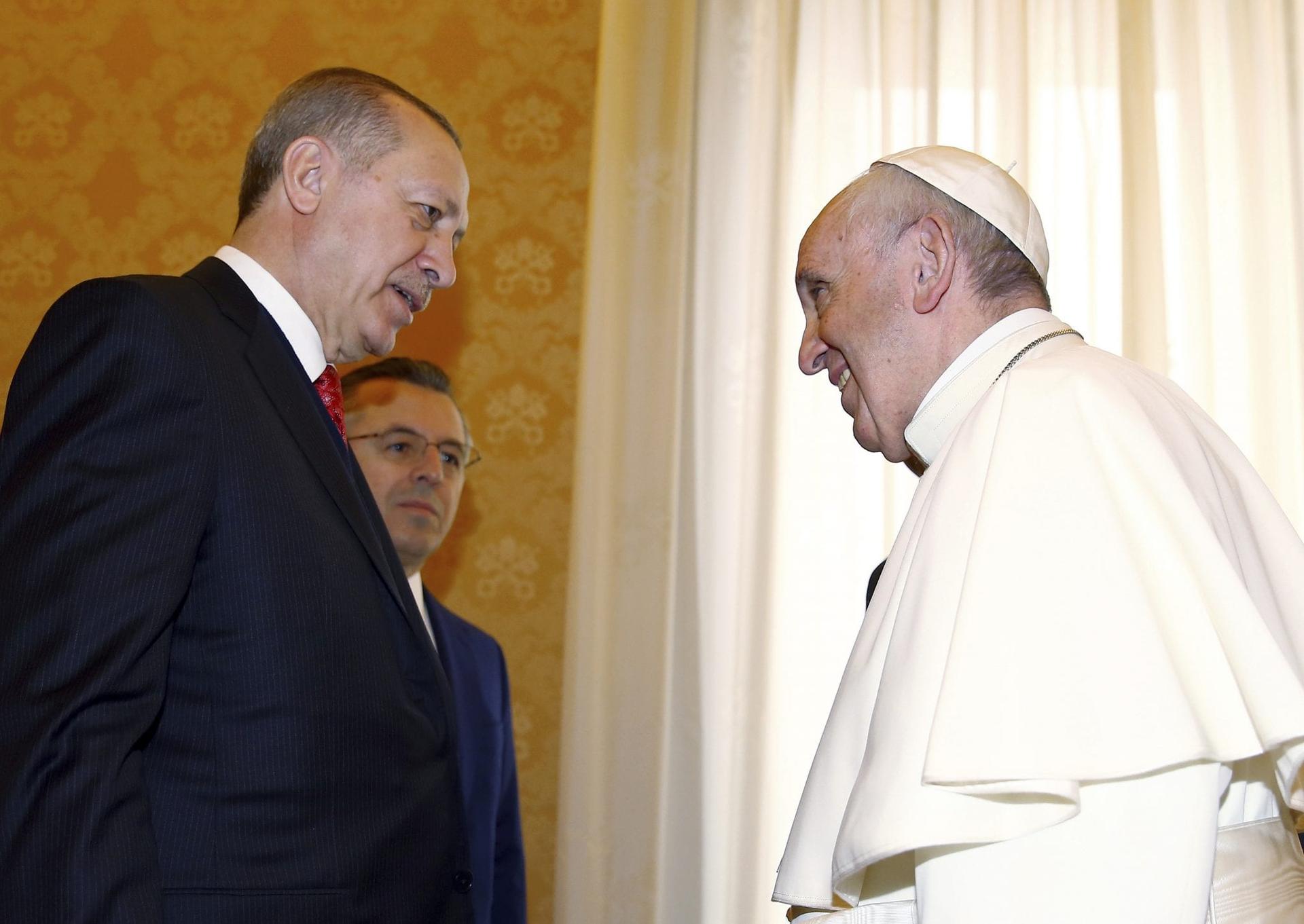It was all smiles inside the Vatican when Turkish President Recep Tayyip Erdoğan met with Pope Francis on Monday morning. Those pleasantries contrasted with demonstrations taking place nearby, as Kurds living in Italy protested Turkish attacks on Kurdish areas in Syria.
Ahead of the visit, Erdoğan said it was “an important opportunity in the context of the establishment of common humanitarian values and messages of friendship and peace.”
The two men were expected to discuss the decision by U.S. President Donald Trump to move the American embassy to Israel to Jerusalem, but Erdoğan told reporters on Sunday that wouldn’t be the only topic of conversation.
“We will approach Palestine, Jerusalem, Syria, Iraq, the fight against terrorism, the problems of refugees and humanitarian aid,” Erdoğan said. “In addition, we will exchange opinions on the fight against Islamophobia and cultural racism.”
The two men met privately for nearly an hour, and according to a Vatican statement, they spoke about bilateral relations between the Holy See and Turkey, the situation within the country and the condition of the Catholic community, Turkey’s role in receiving refugees and the challenges this poses.
Finally, the statement said they discussed “the situation in the Middle East, with particular reference to the status of Jerusalem, highlighting the need to promote peace and stability in the region through dialogue and negotiation, with respect for human rights and international law.”

During the meeting, Francis gave Erdogan a medallion with an image of an angel.
“This is the angel of peace that strangles the devil of war,” the pope said. “This gift symbolizes a world based on peace and justice.”
Francis also gave him an etching of the original St. Peter’s Basilica, which had two bell towers, and copies of his environmental encyclical Laudato Si’ and his message for the 2018 World Day of Peace.
Erdoğan gave the pontiff an illustration of a panorama of Istanbul, and volumes of the poetry of Rumi, a Persian mystic.
However, the first visit by a Turkish head of state to the Vatican in 59 years was nearly overshadowed by Turkey’s military offensive on Kurdish areas in northern Syria.
The attack on the city of Afrin was launched on Jan. 20 and has led to a number of civilian casualties.
Kurdish protestors tried to enter St. Peter’s Square on Sunday to protest the pope’s meeting with Erdoğan but were blocked by police. On Monday, they protested near Castel Sant’Angelo, near the Vatican.

They were holding signs calling Turkey a state-sponsor of terrorism, as well as photos of the civilian victims of the Turkish military offensive. Several also held signs calling for the release of Abdullah Öcalan, a Kurdish nationalist leader who has been jailed in Turkey since 1999.
After Erdoğan left the Vatican, the demonstrators once again tried to make their way into St. Peter’s Square but were stopped by riot police. At least one protestor was injured in the incident.
It was not only Kurdish activists protesting the visit by the Turkish leader.
A group of international press freedom groups released an open letter calling on the pope to bring up Turkey’s crackdown on independent journalists with Erdoğan.
Signatories included the International Press Institute, European Center for Press and Media Freedom, PEN International, and Reporters without Borders.
“Under the pretext of the state of emergency and the fight against terrorism, tens of thousands of people have become victims of arbitrary repression that continues to worsen and that affects many groups within society, including lawyers, journalists, teachers, academics and researchers. At least 150,000 civil servants have lost their jobs, over 50,000 have been jailed and more than 170 journalists are currently in prison along with hundreds of lawyers and human rights defenders,” the letter reads.
“In view of this situation, we hope that, in the course of your meeting with the president of a country that still aspires to become a member of the European Union and that is already a member of the Council of Europe, you will have the opportunity to discuss how damaging it is for Turkey to disregard the rule of law and thereby demonstrate incompatibility with the democratic values of Europe,” the statement continues.
After his meeting with the pope, the Turkish president was scheduled to meet with Italian President Sergio Mattarella and Prime Minister Paolo Gentiloni.














